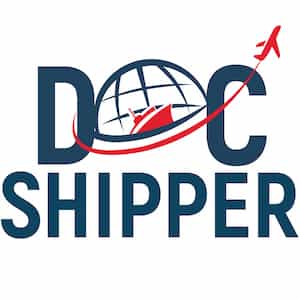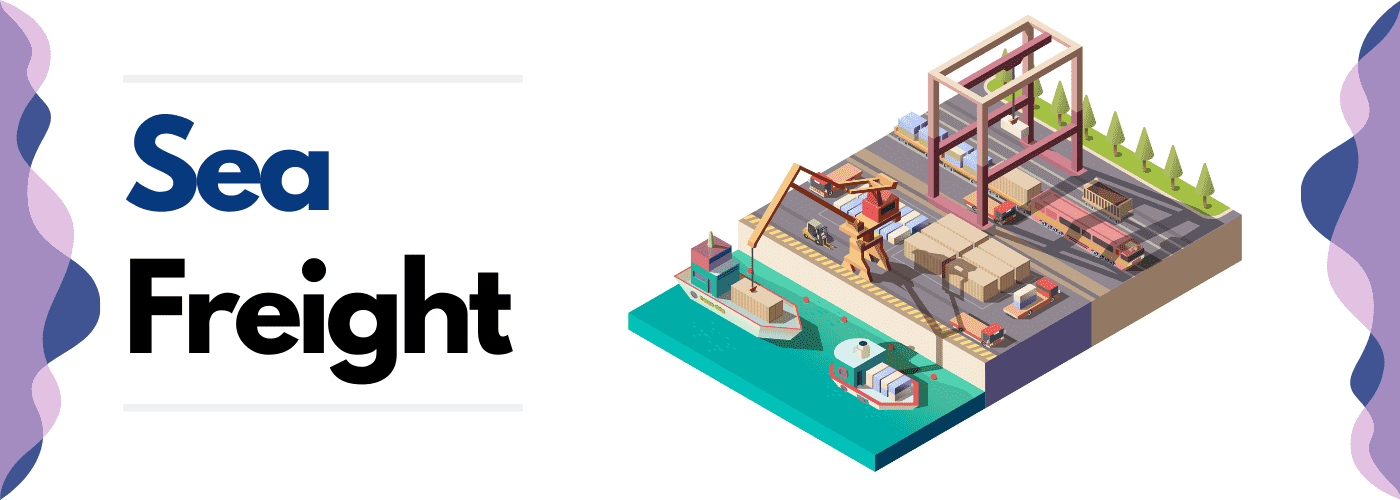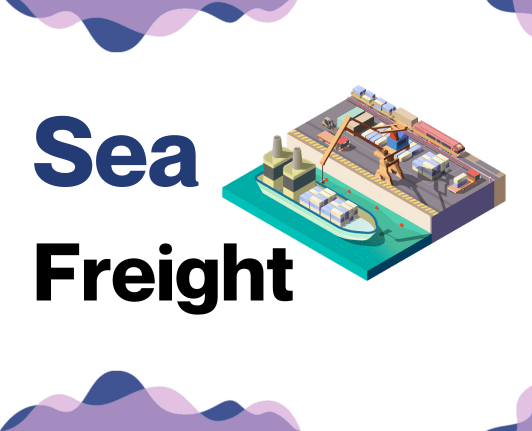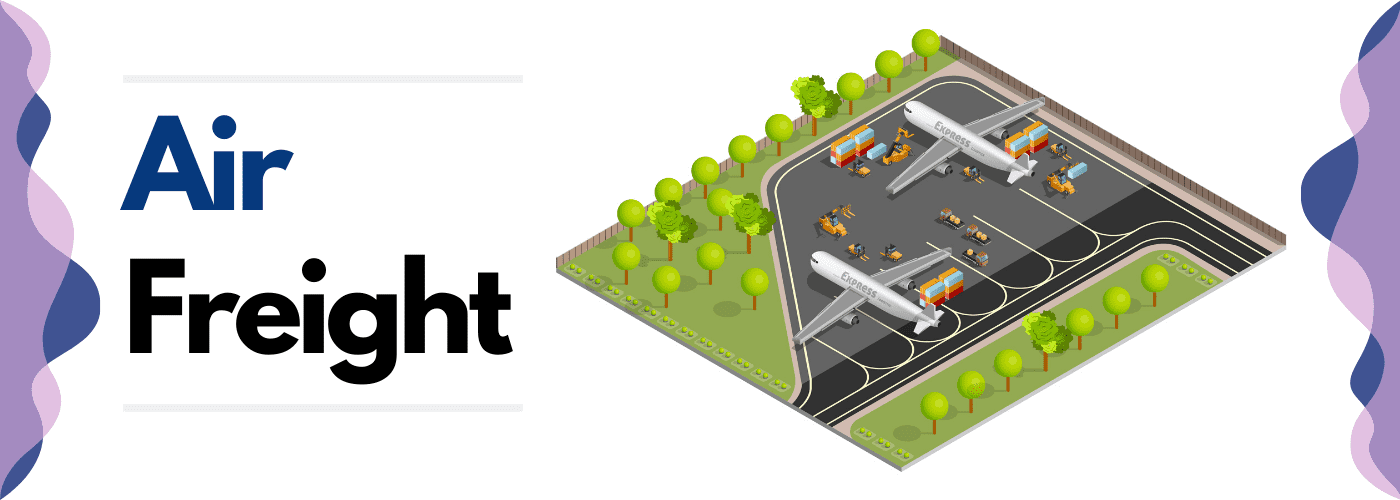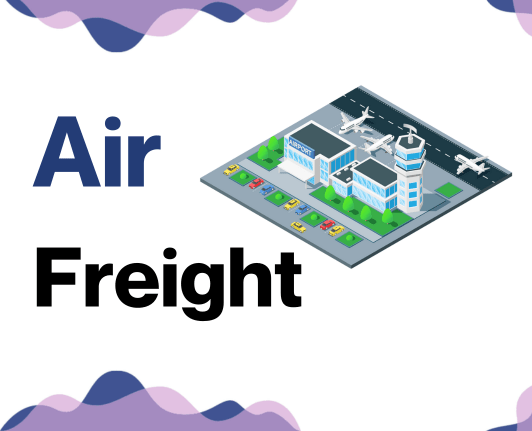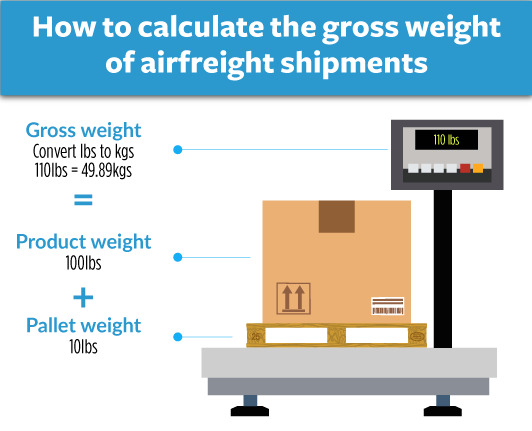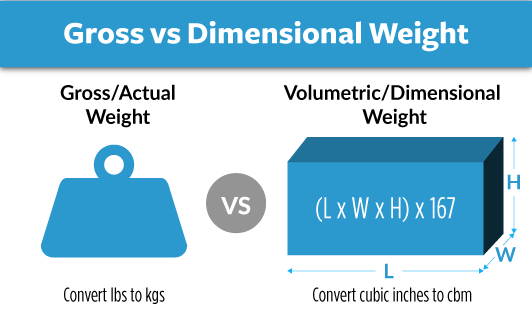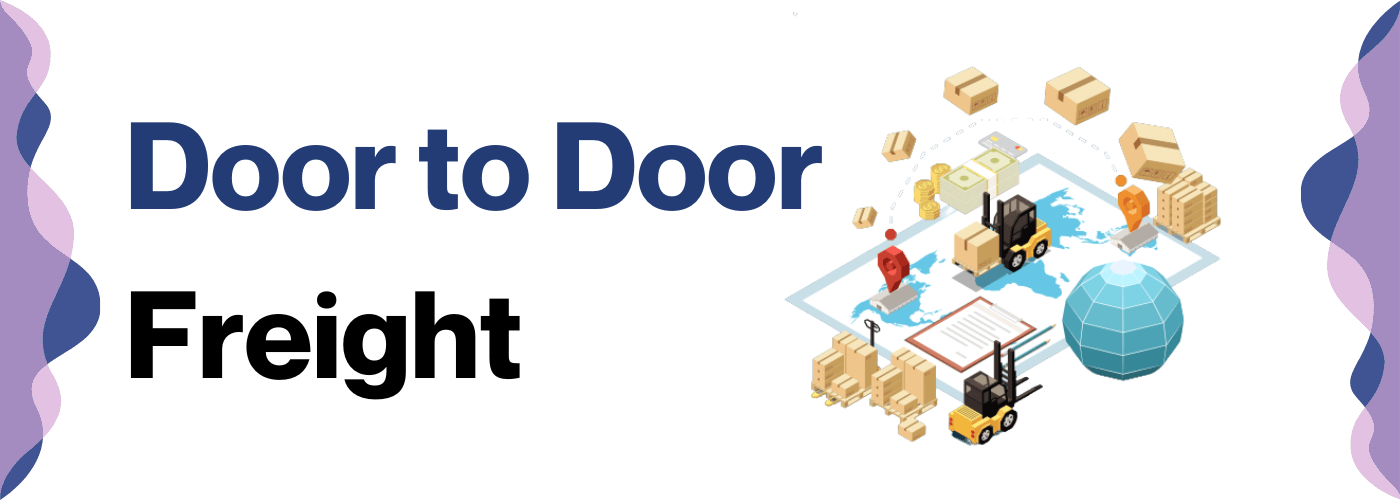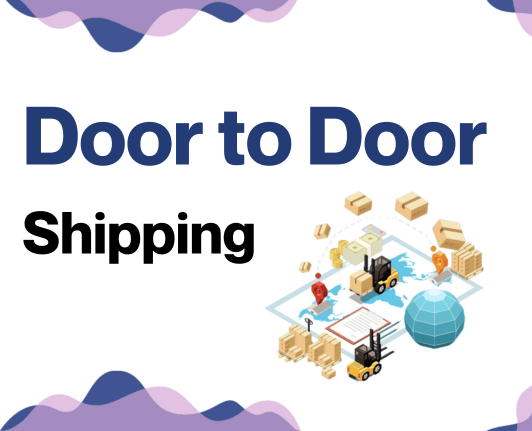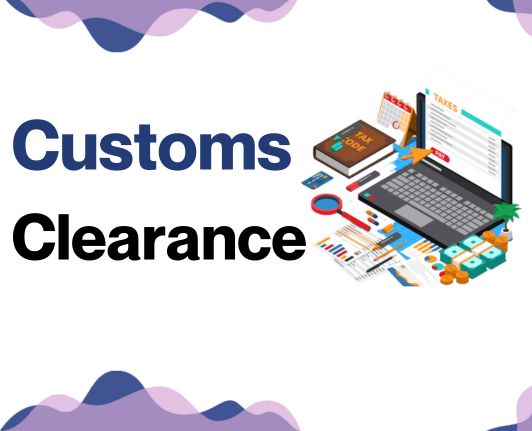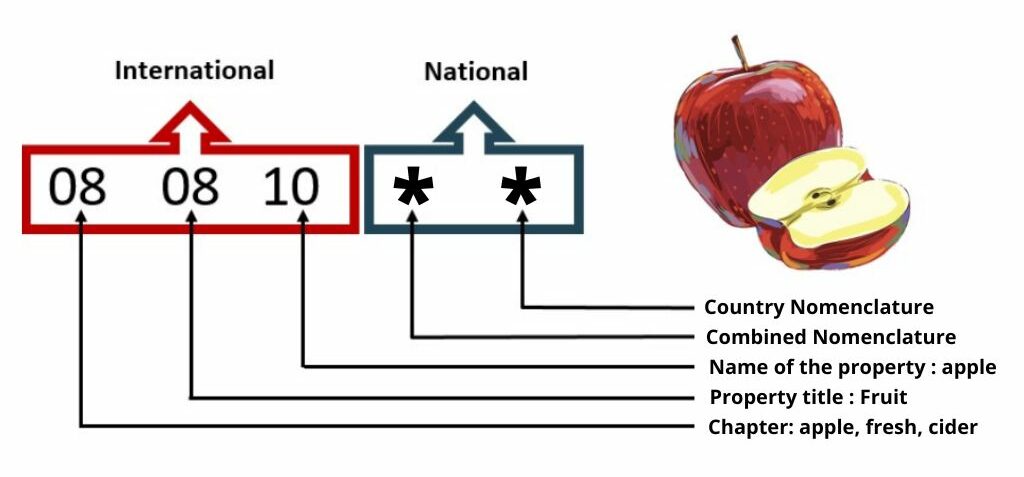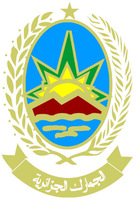Ever tried placing a nasi lemak order all the way from Kuala Lumpur to Algiers? Well, luckily for you, shipping freight between Malaysia and Algeria isn't quite as complicated. The crux of the matter revolves around comprehending the shipping rates, ensuring timely delivery, and unraveling those complicated customs regulations.
This resourceful guide will bring you face-to-face with diverse freight options, elucidate customs clearance protocols, break down complex duties, taxes, and provide tailored advice for businesses seeking to venture into the Malaysian-Algerian freight lanes. From air transport specifics to maritime logistics, expect an enlightening journey through international shipping procedures.
If the process still feels overwhelming, let DocShipper handle it for you! As an international freight forwarder, we walk you through every step of the shipping process, turning potential challenges into successful ventures for businesses of all sizes.
Table of Contents
Which are the different modes of transportation between Malaysia and Algeria?
Deciding on the best transport path for your goods from Malaysia to Algeria can feel like picking out the winning horse in a grand race - challenging but the rewards can be immense. Picture the huge body of water, the Mediterranean Sea, standing guard between these nations. Although sea freight may seem like an obvious choice, it's not always the best. Landlocked countries on the way may complicate your road and rail route. Understanding your specific needs, the nature of your goods and factoring in distance and transit times, your winning horse could be air, road, rail, or sea. The race is on!
How can DocShipper help?
Shipping goods from Malaysia to Algeria doesn't have to be stressful. Let DocShipper simplify the process for you. We handle everything from logistics to customs clearance. Plus, we offer affordable rates and round-the-clock support. Ready to get started? Reach out to us for a free estimate within 24 hours or dial up our consultants for a free chat.
DocShipper Tip: Sea freight might be the best solution for you if:
- You're dealing with hefty quantities or oversized goods. Sea transport is your go-to for maximizing space without stretching your budget.
- Time sensitivity isn't a concern for your shipment. Ocean freight is known for its leisurely pace, especially when compared to the speed of air or rail.
- Your supply chain connects key international harbors. This positions you to take full advantage of a wide-reaching network of ocean trade routes.
Sea freight between Malaysia and Algeria
Ocean freight between Malaysia and Algeria: it's a tale of two vibrant economies, bridged by the vast expanse of water. Key centers like Port Klang (Malaysia) and Algiers (Algeria) become bustling hubs, exchanging high-volume goods that range from palm oil to machinery. Slow yet sure, sea freight offers a cost-effective solution to keep this trade dynamic robust, slashing shipping costs for those bulkier shipments.
But wave-ridden waters aren't without their complexities. Perhaps you're a shipper grappling with customs clearance, labyrinthine documentation, and persistent logistical headaches. Or maybe you're a business caught in the whirlpools of tariff uncertainties, or seaport regulations. The pitfalls are many, and errors can be costly.
Fear not, you're about to dive into a wellspring of knowledge. We'll chart the right course, highlight best practices, and provide crystal-clear specifications to ease those shipping pains. After all, smooth sailing isn't just reserved for the open sea, it applies to your goods en route too! Ready to anchor your knowledge and navigate these waters with confidence? Let's set sail into this jetty of insight.
Main shipping ports in Malaysia
Port Klang
Location and Volume: Situated in Selangor, Port Klang is Malaysia's largest and busiest port, handling a substantial volume of about 13.2 million TEUs per year.
Key Trading Partners and Strategic Importance: China, Indonesia, the USA, Singapore, and India are among its key trading partners. The port holds strategic importance as it's developed into a Global Halal Hub, attracting major halal producers worldwide.
Context for Businesses: If your business is involved in halal products, then Port Klang, with its dedicated Halal logistics facilities, can be a strategic part of your import/export operations.
Penang Port
Location and Volume: Located on the northwestern coast of Peninsular Malaysia, Penang Port handles a volume of over 1.5 million TEUs annually.
Key Trading Partners and Strategic Importance: Primary trading partners are China, Singapore, USA, Hong Kong, and Indonesia. The Port is strategically important because it serves the northern region of Malaysia and facilitates transhipment goods to the Bay of Bengal.
Context for Businesses: If you're headed for markets in the northern region of Malaysia or the Bay of Bengal, Penang Port could provide a valuable link in your shipping strategy.
Johor Port
Location and Volume: Located at the southern tip of Peninsular Malaysia, Johor Port is a multi-purpose port with an annual capacity to handle 40 million tonnes of cargo.
Key Trading Partners and Strategic Importance: It has trade connections globally, with the main partners being Indonesia, Thailand, China, India, and Australia. It's strategically important due to its free-trade zone, making it a vital logistics hub for manufacturing industries.
Context for Businesses: Companies looking to lower costs with duty-free warehouses might find Johor Port a perfect fit for their shipping strategy.
Tanjung Pelepas Port
Location and Volume: Tanjung Pelepas Port, located on Malaysia's southern coast, has an annual container volume of around 9 million TEUs.
Key Trading Partners and Strategic Importance: The port mainly trades with China, Singapore, USA, Hong Kong, and Australia. Known as the fastest-growing port in Malaysia, its strategic significance lies in its efficiency in operations and its proximity to the busy Asia-Pacific region.
Context for Businesses: If your business has high priority for import/export speed and efficiency, Tanjung Pelepas Port can deliver as part of your logistics strategy.
Bintulu Port
Location and Volume: Residing on Borneo's northwestern coast, Bintulu Port has an annual handling capacity of more than 59 million tonnes of cargo.
Key Trading Partners and Strategic Importance: Its key trading partners are Australia, Thailand, India, Indonesia, and China. Bintulu Port hosts the world's largest LNG production facilities, making it strategically significant in the LNG market.
Context for Businesses: For those dealing with LNG, petrochemicals and minerals, Bintulu Port's facilities are exceptionally relevant to your shipping strategy.
Kuantan Port
Location and Volume: Kuantan Port on Malaysia's east coast has an annual cargo volume of over 26 million tonnes.
Key Trading Partners and Strategic Importance: The port engages in substantial trade with China, Singapore, Indonesia, Thailand, and Vietnam. Kuantan Port is critical due to its role in the China-Malaysia Kuantan Industrial Park (CMKIP) and its proximity to the South China Sea.
Context for Businesses: If your business is oriented towards China and Southeast Asia markets or involved in the industry park, Kuantan Port can be a significant component in your logistics strategy.
Main shipping ports in Algeria
Port of Algiers
Location and Volume: Located at the heart of Algeria's capital, the Port of Algiers is a significant hub for shipping activities in North Africa, handling approximately 400,000 TEU annually.
Key Trading Partners and Strategic Importance: Major trading partners include France, Italy, China, and Spain. Its strategic location at the northern tip of Africa makes it a valuable link between Europe, Africa, and Asia.
Context for Businesses: If you're seeking to capture markets in North Africa and Europe, the Port of Algiers would be an essential part of your shipping strategy, given its proximity to major trade routes and extensive container handling services.
Port of Oran
Location and Volume: Nestled in the Gulf of Oran in the Mediterranean Sea, the Port of Oran receives around 200,000 TEU per year.
Key Trading Partners and Strategic Importance: This port maintains strong ties with Spain, France, and Italy. It also forms a crucial part of the Trans-Maghreb Highway, a significant freight corridor in North Africa.
Context for Businesses: If your strategy leans towards Mediterranean markets, the Port of Oran will be crucial due to its robust shipping infrastructure and strategic location on a major transit highway.
Port of Bejaia
Location and Volume: Sitting on the northern coast of Algeria, the Port of Bejaia handles close to 130,000 TEU a year, catering primarily to dry, liquid bulk, and general cargo.
Key Trading Partners and Strategic Importance: This port primarily trades with Italy and France. Its geographical location provides a natural harbor and easy access to the Mediterranean market.
Context for Businesses: Working towards boosting your footprint in the Mediterranean and European markets? The Port of Bejaia, with its accessible location and diverse cargo handling abilities, should be high on your logistics strategy.
Port of Skikda
Location and Volume: Located on the northeastern coast, the Port of Skikda handles approximately 50,000 TEU annually.
Key Trading Partners and Strategic Importance: Skikda trades chiefly with France, Italy, and Spain. It is one of the largest shipping points for petroleum and natural gas in Algeria.
Context for Businesses: If your shipping strategy pertains to the petroleum or energy sector, the Port of Skikda offers specialized services for these industries and a prime location near major oil fields.
Port of Annaba
Location and Volume: Nestled near the border with Tunisia, the Port of Annaba handles around 70,000 TEU annually.
Key Trading Partners and Strategic Importance: Its main trading partners are Italy, Spain, and France. The port is deemed strategically crucial due to its proximity to the El Hadjar steel complex, the largest in Algeria.
Context for Businesses: Any businesses involved in the metal and steel industries might find the Port of Annaba invaluable given its proximity to the El Hadjar complex and its robust handling capabilities.
Port of Arzew
Location and Volume: Based in the Gulf of Arzew, west of Oran, this port handles around 30,000 TEU per year.
Key Trading Partners and Strategic Importance: Major trading partners include Spain, France, and the USA. Arzew is a significant port for the petroleum and liquefied natural gas industry in Algeria.
Context for Businesses: If you're looking to tap into the petroleum or gas channelling sectors, the Port of Arzew, with its strategic location and facilities specialised in these exports, could be a vital asset in your supply chain.
Should I choose FCL or LCL when shipping between Malaysia and Algeria?
As a business, selecting between consolidation and full container freight is no small decision—it's a strategic move that impacts your bottom line. Making the right pick between Full Container Load (FCL) and Less than Container Load (LCL) can mean the difference in cost, delivery times, and overall success in your Malaysia-Algeria shipping journey. Let's navigate these waters together, exploring the unique advantages each option brings to the table, and decide which sea freight strategy makes the most sense for your specific needs. Buckle in, it's time to demystify shipping!
LCL: Less than Container Load
Definition: LCL (Less than Container Load) shipping refers to the transportation of goods that do not fill a whole container. In this case, your cargo shares the container space with goods from other shippers, which are consolidated at the port of loading.
When to Use: Opt for LCL shipping between Malaysia and Algeria when your cargo volume is less than 15 cubic meters (CBM). Being a cost-effective and flexible option, LCL shipping is ideal if you're dealing with smaller shipments as you’re only paying for the space you occupy in the container.
Example: For instance, a trader from Kuala Lumpur is shipping artisanal pottery to Algiers, but her cargo only fills 10 CBM of the container. Instead of getting a full container, she can share space with other shippers, allowing her to save money by shipping LCL.
Cost Implications: By choosing LCL shipping, the overall cost can be significantly lower since you're paying only for the space your cargo occupies, not the entire container. However, keep in mind that LCL shipments might have additional handling charges at the destination because of the need to segregate your cargo from the others in the shared container.
FCL: Full Container Load
Definition:
FCL, or Full Container Load shipping, empowers you to have an entire container for your cargo, whether it's a 20'ft or a 40'ft. Your goods are sealed in this container from the point of origin to the destination, enhancing safety.
When to Use:
FCL is beneficial when shipping high volume goods in excess of approximately 13/14/15 cubic meters. Without other goods to share the space, you can maximize every square foot of your FCL container.
Example:
Consider a furniture manufacturer in Malaysia, shipping a large order to Algeria. The order has bulky items like sofas and dining sets, exceeding 14 cubic meters. Choosing FCL shipping gives the manufacturer the ability to securely pack their products in one container, ensuring safe passage from their warehouse straight to Algeria.
Cost Implications:
The cost-effectiveness of FCL can't be overstated for high volume shipments. While the per-container FCL shipping quote may seem higher than LCL at first glance, the per-unit shipping cost actually turns out to be lower in FCL. Remember that, the more cubic meters of goods you're shipping, the cheaper FCL becomes.
Unlock hassle-free shipping
Discover a seamless path to shipping between Malaysia and Algeria with DocShipper, your trusted freight forwarder. We aim to make your cargo transportation hassle-free by helping you make the right choice between consolidation and full container shipment. Factors such as volume, timeliness, and cost are critical to consider. Our ocean freight experts can guide you to the optimal solution unique to your business. Ready to begin? Contact DocShipper today for a free shipping estimation.
How long does sea freight take between Malaysia and Algeria?
Sea freight shipping from Malaysia to Algeria generally takes an average of 35-40 days, although this depends on various factors. These include the specific ports involved in the journey, the weight of the shipment, as well as the nature of the goods being transported. To receive an accurate quote customized to your unique needs, it's recommended that you consult with a freight forwarder, such as DocShipper, who can provide comprehensive advice and pricing information.
Here’s a brief look at the average transit times for sea freight between some of the main ports in Malaysia and Algeria:
| Malaysian Port | Algerian Port | Average Transit Time (in days) |
| Port Klang | Port of Algiers | 35 |
| Port of Tanjung Pelepas | Port of Oran | 38 |
| Port of Penang | Port of Bejaia | 36 |
| Port of Bintulu | Port of Annaba | 40 |
*Remember, these are average times and can vary based on several factors.
How much does it cost to ship a container between Malaysia and Algeria?
Calculating precise ocean freight rates, particularly for shipping a container from Malaysia to Algeria, often feels like a complex puzzle. It's important to remember that the exact shipping cost per Cubic Meter (CBM) can greatly vary. Factors such as the Point of Loading, Destination, carrier choice, the nature of your goods, and monthly market fluctuations can all impact the final amount. Nevertheless, don't let this uncertainty deter you. Our dedicated shipping specialists have the expertise to provide the best-suiting, most competitive rates, tailoring quotes on a case-by-case basis. Rest assured, we're here to make your shipping journey as clear and cost-effective as possible.
Special transportation services
Out of Gauge (OOG) Container
Definition: These are specialized containers designed to carry Out of Gauge cargo, or items that exceed standard container dimensions. These OOG containers come in flat racks or open tops to accommodate oversized cargo.
Suitable for: Large equipment, machinery, or any oversized items that cannot fit into a standard container.
Examples: Construction equipment, windmill propellers, or industrial machinery.
Why it might be the best choice for you: If you have items that do not conform to standard size restrictions, utilizing an OOG container from Malaysia to Algeria can offer you the flexibility you require.
Break Bulk
Definition: With break bulk, various loose cargo load items are individually, manually loaded and not in containers. This method offers flexibility as goods can be shipped separately.
Suitable for: Odd-sized, heavy, or bulky goods that do not fit into standard containers.
Examples: Large machinery parts, generators, timber, or packed cargo such as sacks or barrels.
Why it might be the best choice for you: Break bulk can be a cost-effective solution for shippers with non-containerized, large, heavy cargo.
Dry Bulk
Definition: Dry bulk refers to goods transported in large quantities in a loose form, in the cargo space of a ship without any specific packaging.
Suitable for: Commodities that are shipped in mass and unpackaged like coal, grain, or minerals.
Examples: Fertilizers, construction materials, or agricultural products such as rice or wheat.
Why it might be the best choice for you: If you're dealing with large quantities of unpackaged goods, dry bulk shipping can offer a cost-effective solution from Malaysia to Algeria.
Roll-on/Roll-off (Ro-Ro)
Definition: In a ro-ro vessel, goods are driven on and off the ship on their own wheels or using a platform vehicle. The term ro-ro refers to the method of loading and unloading the ship.
Suitable for: Vehicles, semi-trailer trucks, trailers, and railroad cars.
Examples: Cars, trucks, tractors, or any other motorized and rolling cargo.
Why it might be the best choice for you: If you are transporting vehicles or wheeled cargo, Ro-Ro offers a cost-effective and efficient solution with minimal handling ensuring less risk of damage during loading and unloading.
Reefer Containers
Definition: Reefer containers are refrigerated containers used to transport temperature-sensitive cargo.
Suitable for: Perishable goods including fruits, vegetables, meat, and dairy products, or other goods that require temperature control.
Examples: Pharmaceuticals, wine, or frozen food.
Why it might be the best choice for you: Reefer containers offer a controlled environment for your perishable goods, ensuring they reach Algeria from Malaysia in optimal condition.
Regardless of your freight needs, DocShipper's experienced team can provide expert advice and support for your Malaysia to Algeria sea freight requirements. Contact us today for a free shipping quote in less than 24 hours.
DocShipper Tip: Air freight might be the best solution for you if:
- You're pressed for time or facing a non-negotiable deadline. Air freight delivers unparalleled speed when it comes to transit times.
- Your shipment is modest in size, falling under 2 CBM. Air freight is particularly well-suited for these smaller consignments.
- Your supply chain includes destinations that are off the beaten maritime or rail paths. Air freight gives you access to a comprehensive global airport network.
Air freight between Malaysia and Algeria
When it comes to jet-speed delivery of your precious cargo - perhaps microchips or valuable pharmaceuticals - from the bustling cities of Malaysia to the golden landscapes of Algeria, air freight takes the cake. It’s your own guard knight, ensuring swiftness, security, and size-suited convenience that can be a smart investment for smaller but pricey shipments.
However, hopping on the air freight wagon is no child’s play. Unfortunately, many shippers overlook crucial steps and land in hot water. Like misusing the weight-volumetric formula in price calculation, leading to overweight goods and blow-out costs. Or going in blindfolded without mastering trade tricks that can save a fortune. Up next, we'll unmask these pitfalls and help you paint a smoother air freight journey.
Air Cargo vs Express Air Freight: How should I ship?
Ever wondered how to get your goods quickly from Malaysia to Algeria without hassle? Let's take a flight! Your business relies on speed, but should you opt for air cargo, your shipment heading along with other items on a commercial airline, or explore the exclusive express air, where your items indulge in a dedicated plane? This guide will help your decision-making, catering to your specific business needs. Buckle up! Your journey into the world of shipping starts here.
Should I choose Air Cargo between Malaysia and Algeria?
Considering air cargo between Malaysia and Algeria could be a savvy decision for your business. Airlines like Malaysia Airlines and Air Algerie provide reliable cargo services. They take cost-effectiveness to new heights, especially for shipments weighing over 100/150 kg (220/330 lbs), making them a budget-friendly option. Sure, transit times may be a bit longer due to fixed schedules, but the reliability and cost-efficiency are hard to beat. So, if your bottom line matters and your shipment size fits, this could be your ideal solution. Malaysia Airlines | Air Algerie
Should I choose Express Air Freight between Malaysia and Algeria?
Express air freight, offered by renowned courier giants such as FedEx, UPS, and DHL, is a specialized service using dedicated cargo planes minus passengers, making it an excellent choice for swift international shipments. Particularly beneficial for shipments under 1 CBM or roughly 100/150 kg (220/330 lbs) of cargo, it ensures your goods reach their destination quickly and securely. Given its benefits, if your cargo between Malaysia and Algeria falls within these limits, opting for express air freight can indeed be an advantageous choice for your business.
Main international airports in Malaysia
Kuala Lumpur International Airport
Cargo Volume: 741,224 tonnes per year.
Key Trading Partners: China, Singapore, USA, Japan, and India
Strategic Importance: As the busiest airport in Malaysia, Kuala Lumpur International plays a crucial role in connecting Malaysia to major trading partners. Its location offers an advantageous logistical point for shipments to and from the entire Asia-Pacific region.
Notable Features: The airport hosts the Advanced Cargo Centre, a comprehensive facility for cargo handling, and the Free Commercial Zone, a dedicated area for logistics and cargo activities.
For Your Business: Consider this airport for higher frequency and more diversified flight routes. Additionally, its state-of-the-art cargo facilities can handle a wide range of goods, including time-sensitive and fragile shipments.
Penang International Airport
Cargo Volume: 355,000 tonnes per year.
Key Trading Partners: China, Indonesia, Thailand, Vietnam, and the Philippines
Strategic Importance: Situated near the Malacca Strait, one of the world’s most important shipping lanes, Penang International Airport serves as a strategic hub for businesses looking to connect with ASEAN and global markets.
Notable Features: Equipped with advanced cargo facilities, this airport is notably strong with electronics and manufacturing industries.
For Your Business: If your business specializes in electronics or manufacturing items, this airport's specialized facilities and strategic geographic position might make it a top choice for your shipping needs.
Kuching International Airport
Cargo Volume: Approximately 23,000 tonnes per year.
Key Trading Partners: China, Singapore, Australia, and Brunei
Strategic Importance: Positioned in East Malaysia, Kuching International Airport serves as a gateway to Borneo and has expanding connections within Asia.
Notable Features: Significant expansion and development plans aim to raise Kuching's cargo handling capabilities.
For Your Business: If your business leans towards trading within the Asia-Pacific region and Borneo, consider this underutilized yet growing logistics point.
Kota Kinabalu International Airport
Cargo Volume: Approximately 10,400 tonnes per year.
Key Trading Partners: China, Taiwan, Singapore, and Indonesia
Strategic Importance: It's the gateway to Borneo island and caters to international flights, being the second busiest airport in Malaysia in terms of passenger volume.
Notable Features: Kota Kinabalu offers direct cargo flights to several districts in East Malaysia as well as international cargo flights.
For Your Business: If your venture implies shipping to Borneo or East Malaysia, this airport's growing passenger traffic might give your brand exposure, a strategic advantage not to be missed.
Senai International Airport
Cargo Volume: More than 10,000 tonnes per year.
Key Trading Partners: China, India, Indonesia, and Japan
Strategic Importance: Located near Johor Port and Singapore, Senai Airport may become an emerging cargo hub due to its strategic position and the growing economic activities in Johor state.
Notable Features: There's an ongoing project to expand the Cargo Village to support larger cargo operations and even accommodate a cargo aircraft hangar.
For Your Business: If your business requires large space for cargo operations, keeping an eye on Senai International's developments can future-proof your shipping strategy, especially for shipments to and from Singapore or Johor Port.
Main international airports in Algeria
Houari Boumediene Airport
Cargo Volume: Over 51,000 tons of cargo annually
Key Trading Partners: France, China, Italy, Spain, and Germany
Strategic Importance: As Algeria's largest and busiest airport, Houari Boumediene is a significant player in North Africa's cargo handling. Located in the capital city Algiers, it acts as a central hub for international freight to and from Algeria.
Notable Features: The airport boasts modern cargo facilities and has direct connections to multiple major global airports. It focuses heavily on safety, with advanced security systems in place.
For Your Business: If your business frequently ships to or from Europe, Houari Boumediene Airport's strong ties with key European trading partners can significantly streamline your logistics process. The airport's efficient cargo handling capacity can ensure timely delivery of your shipments.
Ain Arnat Airport
Cargo Volume: Estimated volume of around 5,000 tons of cargo annually
Key Trading Partners: France, China, and other regions within Africa
Strategic Importance: Located in Setif, Ain Arnat Airport serves as an important cargo hub for Eastern Algeria. It provides crucial connectivity to both domestic and international markets.
Notable Features: Despite being relatively smaller, this airport prides itself on its fast and efficient cargo handling processes. It offers a range of air freight services, including heavy and oversized cargo transportation.
For Your Business: If your business operates within Africa or trades heavily with France and China, a smaller yet efficient airport like Ain Arnat could be a valuable part of your logistics strategy, contributing to cost-effectiveness and timely deliveries.
Oran Ahmed Ben Bella Airport
Cargo Volume: Around 6,500 tons of cargo annually
Key Trading Partners: France, Spain, Morocco, and China
Strategic Importance: Oran Ahmed Ben Bella Airport is Western Algeria’s main international gateway. Serving one of Algeria's most important port cities, Oran, it plays a pivotal role in both passenger and cargo transportation.
Notable Features: The airport has a dedicated cargo terminal and offers various freight services, including refrigerated storage for perishable goods transportation.
For Your Business: If your business involves perishable goods or you frequently trade with Spain and Morocco, Oran Ahmed Ben Bella Airport's specialized facilities and strong connections can provide optimal solutions to meet your shipping needs.
Constantine Mohamed Boudiaf Airport
Cargo Volume: Approximately 2,500 tons of cargo annually
Key Trading Partners: France, Tunisia, and Turkey
Strategic Importance: Located in the city of Constantine, it is the third-largest airport in Algeria. It acts as a significant gateway connecting the Northeastern region of Algeria to the world.
Notable Features: The airport has specialized cargo facilities and focuses on delivering efficient services to carriers. It's also less congested, which results in quicker cargo processing times.
For Your Business: If your shipping strategy seeks to avoid delays and congestion issues at larger airports, then Constantine Mohamed Boudiaf Airport, with its capable cargo handling ability and efficient service, can play a crucial role.
Annaba Rabah Bitat Airport
Cargo Volume: Handles a significant portion of the cargo specific to the Eastern coastal region, with precise figures unavailable.
Key Trading Partners: France, Italy, and domestic flights across Algeria
Strategic Importance: Positioned in the city of Annaba, the airport is crucial for businesses operating in and out of the Eastern coastal region of Algeria.
Notable Features: The airport excels in handling both domestic and international cargo, providing effective connectivity within Algeria and to European partners.
For Your Business: If your business focuses on domestic Algerian markets or trades extensively with France and Italy, Annaba Rabah Bitat can be a strategic choice. The airport's ability to efficiently manage both domestic and international cargo can complement your shipping strategies.
How long does air freight take between Malaysia and Algeria?
The average air freight shipping time between Malaysia and Algeria is estimated to span between 3 to 5 days. However, it's important to note that transit times can fluctuate depending on various factors. These include the specific airports involved, the weight of the cargo, and the nature of the goods being shipped. Accurate timetables can be correctly determined with the help of a specialized freight forwarder like DocShipper.
How much does it cost to ship a parcel between Malaysia and Algeria with air freight?
Air freight costs between Malaysia and Algeria roughly range from $3 to $6 per kg. However, determining an exact price is complex due to factors like the distance from departure and arrival airports, parcel dimensions, weight, and the nature of goods. Rest assured, our team works diligently to secure the most competitive rates, providing quotes tailored to each client's distinctive needs. We understand the intricacies of international freight forwarding and strive for cost-effectiveness in every situation. To obtain your bespoke quote, contact us and receive a response within just 24 hours.
What is the difference between volumetric and gross weight?
Gross weight refers to the total weight of a shipment, including the packaging and pallets. On the other hand, volumetric weight, also known as dimensional weight, considers the space a parcel occupies in relation to its actual weight. Each of these measures is used differently in Air cargo and Express Air Freight services.
In Air cargo, the volumetric weight is calculated by multiplying the length (cm), width (cm), and height (cm) of the cargo and dividing the result by 6,000. For instance, a shipment with dimensions of 100cm x 60cm x 80cm would have a volumetric weight of 80 kg (or about 176 lbs).
For Express Air Freight, the dimensional weight is calculated by dividing the overall cubic size of the package (in centimeters) by 5,000. So, for a shipment package with the same dimensions, the dimensional weight would be 96kg (or about 211 lbs).
Gross weight, for both systems, is simply the actual weight of your shipment. If your package weighs 120 kg (264 lbs), that's its gross weight.
Why do these calculations matter? Freight charges are driven by the 'chargeable weight,' which is effectively the higher of the gross and volumetric weight. Therefore, understanding these calculations will help you optimize your packaging and potentially save on shipping costs.
DocShipper tip: Door to Door might be the best solution for you if:
- You value convenience and want a seamless shipping process, as door-to-door takes care of every step from pickup to delivery.
- You prefer a single point of contact, as door-to-door services typically provide a dedicated agent to handle all aspects of the shipment.
- You want to minimize the handling of your goods, reducing the risk of damage or loss, as door-to-door minimizes transitions between different modes of transport.
Door to door between Malaysia and Algeria
Navigating international transport can be a maze, but Door to Door shipping, a service that handles your shipment from pickup to delivery, can simplify things enormously. Especially between Malaysia and Algeria, you'll find considerable benefits, from cost-efficiency to time-saving. It's a one-stop solution making global shipment effortless. So, ready to unpack the advantages of this option? Let's dive in!
Overview – Door to Door
Experience hassle-free shipping from Malaysia to Algeria with door-to-door service. Viewed as a life-saver by many of DocShipper's clients, it evolves beyond the perplexities of shipping, from complex customs clearance to transportation hitches. Though it might be pricier than other options, the convenience and exhaustive coverage make it worthwhile. Imagine sitting back while experts handle your shipment, saving you time and stress. Why not join countless businesses who've reaped the benefits of seamless, all-inclusive shipping service? Consider door-to-door shipping for your business needs.
Why should I use a Door to Door service between Malaysia and Algeria?
Imagine herding cats, but the cats are actually your precious freight from Malaysia to Algeria. Pretty chaotic, right? Thankfully, using a Door to Door service can save you from losing your mind, and here’s why.
First off, picture stress-free logistics. By handling the pick-up and delivery of your goods, the logistic hassle translates into a logistical dream. You simply have to hand over your shipment and your job is done!
The second plus is speedy and kissing lateness goodbye. Shipments of an urgent nature not only reach on time but often earlier, faster than you can say 'Where are my cats...err, cargo?'
Third, shipments are more like your baby – complex and requiring specialized care. A door-to-door service ensures that delicate or complicated cargo gets the royal treatment it deserves, protecting it vigorously from pick-up to delivery.
At the fourth stop, we have trucking. This service caters to your needs by offering seamless trucking until your goods reach the desired final destination. It's like a food delivery service, but for your freight.
Lastly, convenience shines out as the fifth star in this constellation of reasons. You get to avoid customs headaches, navigation trials, and monitoring problems because they assume responsibility for your goods. Ding-dong, your cargo has arrived - enjoy the convenience!
Door to Door service really is the knight in shiny armor for your shipment worries, turning potential chaos into a smooth ride. So why not relax, leave the details to the experts, and just await the doorbell?
DocShipper – Door to Door specialist between Malaysia and Algeria
Get your cargo moving from Malaysia to Algeria with DocShipper's easy, end-to-end freight service. We expertly navigate logistics, handling all aspects from packing to customs for a hassle-free experience. Choose from sea, air, road or rail - we have it covered. With a dedicated Account Executive for each client, you're in professional hands. Reach out for a free estimate within 24 hours or consult our experts anytime at no cost. Experience our commitment to smooth, efficient shipping that lets you focus on your business, not the cargo.
Customs clearance in Algeria for goods imported from Malaysia
Customs clearance—the process of importing goods from one country to another—is notoriously intricate, loaded with potential setbacks such as unforeseen costs. Navigating through the labyrinth of customs duties, taxes, quotas, and licenses in Algeria, when moving goods from Malaysia, can seem daunting. Miscalculations or misinterpretations could result in nasty surprises or even your cargo getting held up. Understanding these areas is essential to prevent your business operation from being thrown off track. This guide will help you unravel these complexities.
DocShipper stands ready to simplify this process for you, handling all kinds of cargo, worldwide. Need a project estimate? Provide us with your cargo's origin, value, and HS Code—we will handle the rest! Save time, prevent errors and enjoy peace of mind with DocShipper. Prepare to dive deeper in the following sections, teaching you to navigate Algerian customs like a pro.
How to calculate duties & taxes when importing from Malaysia to Algeria?
The journey of your goods from Malaysia to Algeria carries with it a variety of financial implications, one of which is the calculation of customs duties and taxes. It might seem daunting, but armed with the right knowledge and tools, it doesn't have to be. The key factors required for these calculations revolve around the country of origin, HS Code (Harmonized System Code), customs value, and the applicable tariff rate, as well as any additional taxes and fees applicable to your product. But where to start, you might wonder? It all begins with identifying the actual country where your goods were manufactured or produced, as this impacts the tariff classification and consequently, the amount of duty you will need to pay. It's the first critical step in this financial journey that will help ensure you're not hit with any unexpected expenses upon arrival in Algeria.
Step 1 - Identify the Country of Origin
First off, you may think pinpointing the country of origin is a no-brainer, but it's more crucial than you might assume. Here's why:
1. It affects how customs determines tariff rates under the Harmonized System (HS) code.
2. Trade agreements between Algeria and Malaysia can alter duties and taxes. For example, the Agreement on Trade in Goods can lead to reduced or even zero tariffs.
3. It allows you to navigate import restrictions smoothly. Algeria has specific rules for certain goods, such as pharmaceuticals, and knowing your product's origin can keep your shipment clear of any legal tangles.
4. Different countries of origin can cause fluctuations in the import duties, impacting your shipping budget.
5. It ensures compliance with both countries' customs laws for a hiccup-free shipping process.
So, don't overlook this simple, yet essential step! Secure your HS code with absolute certainty and pave the way for a smooth, cost-effective shipment. You have what it takes to master the art of global shipping. So gear up for successful trade with Algeria, happy shipping!
Step 2 - Find the HS Code of your product
The Harmonized System (HS) Code is a standardized numerical method of classifying traded products. It's employed by customs authorities around the globe to identify products for the application of duties and taxes. An essential part of your shipping process, the accurate determination of the HS code for your product ensures precise customs declaration.
Finding the HS code for your product isn't as challenging as it might sound. Often, the most straightforward method is to get it directly from your supplier. They are usually well-acquainted with the products they're exporting, including related regulation specifics.
In circumstances where this isn't possible, you can determine the HS code yourself. It all starts by using an HS lookup tool. We recommend the Harmonized Tariff Schedule. Once on the site, enter the name of your product in the search bar and hit enter. Scroll to the Heading/Subheading column, here lies your product's HS code.
A word of caution: accuracy in deducing the HS Code is fundamental. An erroneous code can lead not only to shipment delays but hefty fines as well. It's not a scenario you'd want your business to face. Precision is the key.
Here's an infographic showing you how to read an HS code.
Step 3 - Calculate the Customs Value
Grasping the concept of customs value is pivotal for a smooth customs clearance process in Algeria when importing goods from Malaysia. Think of it like this - customs value isn't essentially the actual value of your goods. Instead, it's the CIF value which is a sum total of the price of your goods (in USD), the cost of international shipping, and the insurance cost.
For instance, if your products cost $10,000, shipping is $2000, and insurance is $500, you'll calculate your customs value as $12,500. Now, this is the figure you'll use to calculate your duty and taxes, not the mere cost of the products. Understanding this can save you from any potential customs hiccups and keep the transit of your goods swift and efficient!
Step 4 - Figure out the applicable Import Tariff
An import tariff is a tax imposed by a country on goods imported from abroad. It's key to recognize your product's applicable tariffs for an accurate calculation of your total import costs.
For Algeria, the prevalent tariff system is the Harmonized System (HS). Your HS code, identified in earlier stages of the customs clearance process, would play a vital role here.
Here is a step-by-step guide to finding the appropriate tariff rate:
1. Navigate to the website of the Algerian customs authority or an international customs database.
2. Enter your product's HS code and Malaysia as the country of origin.
3. Check out the applied duties and taxes on your product.
To illustrate, let's say your product is electronics with an HS code 8517. If the tool shows a tariff rate of 15%, and your CIF (cost, insurance, and freight) is $1,000, then your import duties would be calculated by multiplying the CIF cost by the tariff rate i.e., $1,000 x 0.15 = $150.
Hence, your total import costs would be CIF costs plus import duties, totaling $1150. Understanding this figure helps you strategically price your goods and ensure your business remains competitive in the Algerian market.
Step 5 - Consider other Import Duties and Taxes
Apart from the standard tariff rate, certain additional duties and taxes influence the cost of importing goods from Malaysia to Algeria. For instance, excise duties apply to certain goods like luxury or demerit goods. Likewise, anti-dumping taxes may apply if goods are being sold significantly below their normal value, posing a risk to Algerian industries.
Then comes the significant part - Value Added Tax (VAT). In Algeria, VAT rates vary. Here's a formula to give you an idea: (Cost of goods + Shipping Charges + Insurance) x VAT rate = VAT cost. As an example, if your goods cost $3000, with $500 for shipping and insurance, and the VAT rate is 19%, your VAT would be ($3500 x 19%)=$665.
Remember, these figures are hypothetical; your actual costs can differ based on the specifics of your shipment. Regularly updating yourself with the relevant regulations of both countries can reduce unexpected expenses, streamlining your import process. Remember, effective planning minimizes costs and maximizes potential for profit.
Step 6 - Calculate the Customs Duties
Calculating customs duties for shipping goods from Malaysia to Algeria involves integrating various components depending on your specific consignment. Each calculation includes the Customs Value of the goods.
First, for goods that attract Customs Duty but are VAT exempt, simply apply the Algerian Duty Rate to the Customs Value. For instance, if the custom value of your machinery is $300 and the duty rate is 10%, your customs duty would be $30.
Second, for goods attracting both Customs Duty and VAT, calculate customs duty as in the first example, then add VAT. For example, if your cosmetic goods have a $500 customs value, a 15% duty rate and a 19% VAT rate, your customs duty is $75 and VAT is $95, totalling $170.
Lastly, when there's Customs Duty, VAT, and Anti-Dumping Taxes (ADT) and Excise Duty, calculate duty and VAT as before, then add ADT and Excise Duties. Suppose you import $700 worth of wine, with a 20% duty, 19% VAT, 5% ADT, and 10% Excise Duty, the total charge would be $189 for duty, $133 for VAT, $35 for ADT, and $70 for Excise Duty, amounting to $427.
At DocShipper, we're experts in streamlining these intricate procedures worldwide. We ensure you only pay what's necessary, allowing you to concentrate on your core business. Reach out to us for a free quotation within 24 hours!
Does DocShipper charge customs fees?
Although DocShipper serves as a customs broker in Malaysia and Algeria, understand that we don't levy any customs duties. You'll pay us for customs clearance services, but duties and taxes go directly to the government. Don't confuse these charges! Think of it like a handling fee versus purchase price at a store. And rest assured, transparency is key to us: You'll receive all relevant customs documentation as proof that you've only paid what the government charged. Remember, in the world of shipping, it's essential to know where your money goes!
Contact Details for Customs Authorities
Malaysia Customs
Official name: Royal Malaysian Customs Department.
Official website: http://www.customs.gov.my/en/
Algeria Customs
Official name: Algerian Customs Directorate
Official website: http://www.douane.gov.dz/
Required documents for customs clearance
Unsure about the document jungle in global shipping? We'll break down essential paperwork for smooth customs sailing: Bill of Lading, Packing List, Certificate of Origin, and CE-standard Documents of Conformity. Say goodbye to confusion, and hello to clear, step-by-step guidance. Ready to decode customs docs? Let's dive in!
Bill of Lading
Your Bill of Lading (BOL) is vital when shipping from Malaysia to Algeria. Think of it as a passport for your goods. It's a legal document outlining the type, quantity, and destination of the goods shipped and marks the ownership transfer from the seller to the buyer. Opting for an electronic or 'telex' release is a smart move - it accelerates the process, saving you precious time. If you're shipping by air, it's all about the Air Waybill (AWB). Similar to a BOL, the AWB details your cargo and destination, speeding up clearance at Algerian customs. Remember, every export is unique - customs require precise, accurate documentation, and your BOL is at the heart of it. Don't underestimate its importance; it's more than just a piece of paper.
Packing List
When shipping goods from Malaysia to Algeria, your Packing List plays a vital role. It's your ultimate checklist, detailing the specifics— from the quantity to the type and weight of your cargo. For instance, if you're importing raw rubber to Algeria, the Packing List ensures every kilogram is accounted for. Both sea and air freight require this document as it helps in customs clearance. It's the shipper's responsibility to guarantee the Packing List's accuracy, as discrepancies can lead to unforeseen delays or additional costs. Always remember, a detailed and accurate Packing List is your key to a hassle-free shipping experience. The more precise you are, the smoother your load will breeze through customs!
Commercial Invoice
Perfecting your Commercial Invoice is crucial for a trouble-free customs clearance when shipping from Malaysia to Algeria. It should provide essential details about your shipment, including sender and receiver's info, detailed product description, harmonized system code (HS code), quantity, and value – all in English. For accuracy, ensure its info aligns with other shipping documents, like the Air Waybill or Bill of Lading. Keep in mind that inaccuracies could lead to customs delays or even penalty! For instance, if your invoice mentions 50 boxes of ceramic mugs but the Bill of Lading lists 55, you might find your shipment held in Algerian customs. Efficiency and meticulousness are your best sidekicks here. Keep that Commercial Invoice in shape and glide smoothly through customs!
Certificate of Origin
Navigating customs from Malaysia to Algeria? Your business might benefit significantly from a detailed Certificate of Origin (CO). This legal document serves as a passport for your goods, testifying their birthplace. For instance, Malaysian-made electronics shipped to Algeria could enjoy preferential duty rates, thanks to trade agreements. The trick is in reliably stating the country of manufacture in your CO. Imagine you're exporting unique Batik prints; a correctly filled-out CO confirms their Malaysian roots, potentially speeding up customs and saving your business money. So, before your goods embark on their journey, ensure your CO is in tip-top shape—it might just be your ticket to smoother and more cost-effective shipping.
Get Started with DocShipper
Exhausted from dealing with the complexities of customs clearance between Malaysia and Algeria? Let DocShipper relieve your stress. Our experts handle every intricate detail of customs procedures to ensure your goods arrive safely and timely. Why wait? Contact us today for a free quote! We’ll get back to you with specifics in less than 24 hours.
Prohibited and Restricted items when importing into Algeria
Shipping to Algeria can feel like walking a tightrope when it comes to prohibited and restricted goods. The rules may be scrupulous and knowing what's off-limits is crucial to avoid costly mishaps. Let's unravel this mystery together and keep costly fines at bay.
Restricted Products
- If you're shipping Pharmaceutical products, it's crucial to get a Goods Import License from the Algerian Ministry of Health Ministry of Health.
- For Both wild and domesticated animals, you have to secure an Animal Imports Permit from the Algerian Veterinary Services Veterinary Services.
- Explosive materials and Firearms can be a tricky business. It's essential to apply for an Import Permit for Arms and Explosives from the Ministry of Interior of Algeria Ministry of Interior.
- Trading in Antiques and Artifacts? You'll be needing a Special Licence for Import of Antiques from the Ministry of Culture of Algeria Ministry of Culture.
- For those dealing with Radio and telecomunication equipment, be prepared to get a Radio and Telecommunications Equipment License from the Postal and Electronic Communications Regulatory Authority ARPCE .
- To ship Tobacco and alcohol products, you have to apply for a special permit from the Ministry of Trade of Algeria Ministry of Trade.
- If you're working with Genetically modified organisms (GMO), get the necessary permit from the National Agency for Biosafety National Agency for Biosafety.
- Moving with Radioactive substances? You're going to need a Radioactive Substances License from the Algerian Nuclear Regulatory Authority Nuclear Regulatory Authority.
*These are the current restricted categories. Remember, it's always a good idea to double-check directly with the Algerian customs authorities for the most up-to-date information, as the list is subject to changes.
Prohibited products
- Narcotic drugs not prescribed by a medical professional
- Illicit or counterfeit money
- Weapons, explosive materials, and fireworks
- Pornographic and obscene material
- Equipment for broadcasting or receiving external TV programming
- Endangered wildlife and their byproducts
- Certain animal and plant species, including their byproducts
- Fruits, vegetables, and nuts not complying with Algerian health regulations
- Alcohol and beverages containing more than 0.5% alcohol
- Products that may be misleading due to resemblance to coins or Algerian currency
- Goods from Israel or goods that respect the Arab boycott of Israel
- Publications, images, and other media contrary to Islamic morals or public order
- Counterfeit or pirated goods, including digital goods
- Products containing certain hazardous substances
- Ivory, whether in raw or refined form
- Radioactive materials without requisite permits
- Asbestos or items containing asbestos
- Waste, residues, and other environmentally dangerous substances without proper packaging or labeling.
Are there any trade agreements between Malaysia and Algeria
Unfortunately, there are currently no Free Trade Agreements (FTAs) or Economic Partnership Agreements (EPAs) between Malaysia and Algeria. However, both countries are engaging in ongoing discussions about solidifying trade relations, potentially outlining future agreements. So, as you strategize your shipping operations between these nations, watch out for new developments that might offer lucrative opportunities for your business or act as potential game-changers in the logistics landscape. Remember, staying adaptable can help you successfully navigate ever-evolving international trade terrains.
Malaysia - Algeria trade and economic relationship
Historically, Malaysia-Algeria's economic ties have been strong, tracing back to Algeria's independence in 1962. The early 2000s marked a significant turn in this relationship, with Malaysian companies like Petronas emerging as key players in Algeria's oil and gas sector. Through the years, cooperation has expanded across various sectors including construction, telecommunications, and manufacturing.
Recent figures underscore a positive economic scenario. As of 2019, Malaysian investments in Algeria stood at USD 5 billion, and bilateral trade volume reached an impressive RM 1 billion, with major commodities being palm oil, machinery, and chemical products from Malaysia, and oil and gas from Algeria. While witnessing occasional fluctuations, this robust trade relationship continues to offer compelling investment and trade opportunities for businesses in both nations. In 2024, Malaysia's bilateral trade with Algeria doubled to RM1.19 billion .
Your Next Step with DocShipper
Ending the logistical maze of shipping from Malaysia to Algeria, DocShipper is the lifeline you've been looking for. Simplify your shipping with our end-to-end service, expert customs support, and unrivalled freight options. Experiencing your international trade efforts turning into smooth sailing is one click away. Turn to DocShipper - we are your shipping solution. Let's start planning your next shipment today. Contact us now!
Additional logistics services
Unearth the full spectrum of our end-to-end logistics solutions beyond shipping and customs, as DocShipper seamlessly navigates the complexities of your supply chain, packing a punch to your operational efficiency.
Warehousing and storage
Are you grappling with finding trustworthy storage facilities in Malaysia and Algeria? Tempted to break the ice with temperature-controlled warehousing for that special cargo? Your concerns about quality and safety are understood here. Find more about how we extinguish such worries on our page dedicated to Warehousing.
Packaging and repackaging
Ensuring your goods are protected with appropriate packaging and repackaging is crucial for shipments from Malaysia to Algeria. A credible agent – like us – can expertly cater to diverse products, from electronics to textiles. Imagine sending a fragile ceramic vase, you would want the utmost care and professional repackaging upon arrival, wouldn't you? For in-depth knowledge on our top-notch packing services, head to Freight packaging .
Cargo insurance
Shipping goods internationally isn't without risks. Cargo insurance, quite unlike fire insurance, offers wider coverage, shielding you from potential mishaps during transit. Imagine your electronics shipment gets shock damage during air freight, or your high-value goods get stolen. Your cargo insurance kicks in then, protecting your bottom line. For peace of mind and financial fortification, consider this critical safeguard. More info on our dedicated page: Cargo Insurance.
Supplier Management (Sourcing)
Are you keen on sourcing or manufacturing in Asia or East Europe, but clueless on finding the right suppliers? DocShipper has got your back. We streamline your procurement process, find reliable suppliers, and even overcome language obstacles. Imagine having a seamless bridge between you and your dream supplier. Learn more about how we can light your way on our Sourcing services page.
Personal effects shipping
Moving grandma's heirloom dressing table or your collection of bulky sculptures between Malaysia and Algeria can be tricky. At DocShipper, we cater to your needs with professional care, handling your personal belongings as if they were our own. We adapt to the unique demands of each item, ensuring your treasures arrive safely at their new home. Ready to unpack more about this service? Discover more at our dedicated page: Shipping Personal Belongings
Quality Control
Keeping a keen eye on quality during manufacturing or customization is key when shipping from Malaysia to Algeria. A minor error could lead to hefty customs fines or product returns, slowing your business flow. For instance, shipping improperly labeled textiles could amass unexpected costs. Our quality control service ensures your goods match international standards every time. More info on our dedicated page: Quality Inspection
Product compliance services
Ensure your goods are destination-ready with our Product Compliance Services. Trade regulations can prove a tightrope walk – avoid hefty fines and delays with our expert-led laboratory testing. By streamlining your compliance, we help secure product certifications and keep your shipments sailing smoothly. Discover more details at our Product compliance services page.
FAQ | For 1st-time importers between Malaysia and Algeria
What is the necessary paperwork during shipping between Malaysia and Algeria?
When shipping from Malaysia to Algeria, the necessary paperwork primarily includes a bill of lading for sea freight or an air waybill for air freight, which we at DocShipper meticulously handle for you. It's imperative that you provide us with the packing list and the commercial invoice. Additionally, depending on the nature of your goods, other documents may be required, such as Material Safety Data Sheets (MSDS) or certifications. Remember, each shipment has unique needs, and we are here to assist you every step of the way.
Do I need a customs broker while importing in Algeria?
While not obligatory, it's highly suggested to employ a customs broker when importing goods into Algeria. The customs process can be intricate and requires a set of necessary documents to complete. As professionals in this area, we at DocShipper can handle these complexities on your behalf. We act as your representatives during customs clearance in the majority of shipments, ensuring a smoother and hassle-free process. Leveraging our expertise, we'll guide your cargo through all customs related procedures, reducing any potential shipment delays.
Can air freight be cheaper than sea freight between Malaysia and Algeria?
While it's challenging to generalize, your cargo's weight and volume significantly influence whether air or sea freight is cheaper. For shipments under 1.5 cubic meters or 300kg (660 lbs), air freight emerges as a potential cost-effective option between Malaysia and Algeria. Keep in mind, factors such as route also play a role. At DocShipper, our dedicated account executives are trained to always provide the most competitive options, assuring you get the best mode of transportation for your needs.
Do I need to pay insurance while importing my goods to Algeria?
While insurance isn't a requirement for shipping goods, including to Algeria, we at DocShipper strongly advise you to consider it. You may never anticipate when incidents like damage, loss, or theft could take place during transport, and these can have significant financial implications. Insurance coverage provides you with a safety net, reducing the risk you're exposed to in such situations. This tiny investment can save you a lot of stresses and troubles. It's always better to be safe than sorry in the logistics world.
What is the cheapest way to ship to Algeria from Malaysia?
The cheapest method to ship goods from Malaysia to Algeria is typically using sea freight, specifically LCL (Less than Container Load) for smaller shipments. This option takes into consideration the considerable geographical distance between the two countries, but do note it takes longer, usually between 4-6 weeks. We, at DocShipper, also help streamline customs procedures to ensure a smooth and economical shipping process.
EXW, FOB, or CIF?
Choosing between EXW (Ex Works), FOB (Free On Board), or CIF (Cost, Insurance, and Freight) often comes down to your relationship with your supplier. Keep in mind that logistics might not be your supplier's expertise, suggesting an agent like us, at DocShipper, manage the international freight and destination processes. Generally, suppliers sell under EXW conditions (they're responsible until the goods are ready at their factory), or FOB conditions (they manage all local charges until the goods reach the origin terminal). Nevertheless, here at DocShipper, we provide a flexible door-to-door service tailored to your needs, ensuring a smooth and hassle-free shipping process.
Goods have arrived at my port in Algeria, how do I get them delivered to the final destination?
Upon arrival of your goods at Algeria, if we're managing your cargo under CIF/CFR incoterms, you'll need a custom broker or freight forwarder for goods clearance, payment of import charges, and final delivery. However, our team can also handle a DAP incoterms, ensuring a seamless process for you. Be sure to discuss this with your dedicated account executive for clear guidance.
Does your quotation include all cost?
Absolutely, we believe in transparency and therefore, there are no hidden fees in our quotations. While our quotations do cover most costs, please note they don't include duties and taxes at the destination. If you wish, your dedicated account executive is readily available to help estimate these additional charges for you, ensuring no unpleasant surprises.
